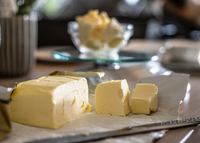How they’re processed, which to avoid—and how to sustainably consume them
Highly processed oils made from soy, corn, canola and sunflower were once marketed as the healthiest option on the shelves, but lately they’ve been cause for concern. The mainstream has said one thing, but many doctors and nutritionists are finding that these oils, which are overflowing in our food products, are leading to chronic health conditions and being processed unsustainably.
How seed oils are extracted
Seed, plant and vegetable oils may sound natural, but there’s nothing natural about the refining process. After gathering the seeds from plants like corn, sunflowers and soybeans, they’re superheated until the fatty acids “oxidize” in a process called “hydrogenation”.
The resulting oils are then processed with a petroleum-based solvent, like hexane, to maximize the amount of oil extracted from them, where afterwards they’re coated in a chemical cocktail to mask their colour and smell. Industrial seed oil manufacturers have to use chemicals to deodorize the oils because they have a very off-putting smell once extracted, and this deodorization process is what produces trans fats.
This chemical process affects our health
Vegetable oils didn’t come into the picture until the early 1900s and before we knew it, we were singing their praises and told to substitute them into all of our cooking. They haven't just been used for cooking though—you can find canola oil, sunflower oil and vegetable oil in pre-made salad dressings, hummus, margarine, and vegan butters and cheeses.
Based on our modern diet, we consume too much omega-6 and not enough omega-3, and seed oils are the most significant contributor to this imbalance. This plays a role in putting us in a chronic state of inflammation, which has led to an increase in asthma, autoimmune diseases, cognitive and mental health conditions (like dementia, depression and anxiety), IBS, infertility, and less extreme symptoms like low energy, brain fog and mood swings.
Because seed oils are created at such a high heat and pressure, they’re exposed to oxidative damage and since chemicals need to be added, it transforms any small amount of omega-3 present into trans fatty acid, which clogs arteries and increases the chance of blood clots.
On top of this, polyunsaturated fats are very fragile and free-radical forming oxidation happens when it’s exposed to heat, light, or oxygen—which makes cooking with these oils (or frying with them) very dangerous. The excessive inflammation happens because of the presence of these free radicals which eventually need something to attach to. Once they land, they attack cell membranes, red blood cells, and cause damage to DNA and RNA, leading to the array of health issues.
What can we eat safely? Photo by Sorin Gheorghita on Unsplash
Photo by Sorin Gheorghita on Unsplash
Contrary to what we’ve been told, animal-based fats aren’t bad for us at all. We’ve been consuming them for thousands of years and with recent regenerative farming practices and sustainable farming, we know how to create butter and other animal fats with the planet and animals in mind as well.
Grass-fed butter, ghee, tallow and lard (all in moderation) are rich with naturally occurring vitamins and nutrients. For anyone who is plant-based, the world of processed vegan foods is loaded with seed oils, so it’s best to go as whole-food based as possible and stick to monounsaturated fats like olive, avocado and coconut oils.
When incorporating olive, avocado and coconut oils into your meals, make sure to use a no-heat or low-heat recipe. Look for organic, first-cold pressed or cold-pressed expeller-pressed, unrefined or extra virgin.
There’s a lot of conflicting information out there, so the best way to sift through the noise is to figure out who is sponsoring a study, who is profiting off of the sales of certain products, and did this take a lot of processing to get onto my plate?
When all else fails, trust whole foods grown by reputable farmers.

